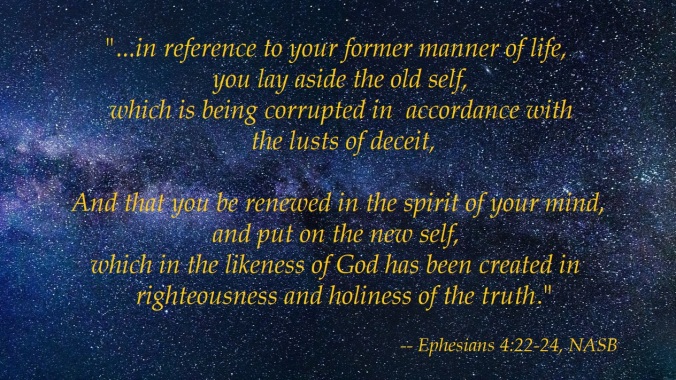“Go therefore and make disciples of all the nations…teaching them to observe all that I commanded you; and lo, I am with you always, even to the end of the age” (Matthew 28:19-20, NASB).
——————–
Contents:
1) The Way of Man (Bill Crews)
2) Thank You, God, For Patience (John Thompson)
——————–

-1-
The Way of Man
Bill Crews
One of the fundamental principles which must be embraced by those who truly believe in God, earnestly desire to honor Him as God, and ardently long to spend eternity in heaven with Him, is found in Jeremiah 10:23. It reads: “O Jehovah, I know that the way of man is not in himself; it is not in man that walketh to direct his steps.”
In this verse from one of God’s prophets can be seen the divine right and wisdom of God and the weaknesses and limitations of men. God is the Creator, and man is the creature; God is the Maker, and man is the made; God is the offended, and man is the offender; God is the sinned against, and man the sinner. God has the divine right to direct our religious and moral path; God also has the divine wisdom essential to that great task. Man has neither.
How can we frail creatures know what is pleasing to Him who is “over all and through all and in all” (Ephesians 4:6), whose thoughts and ways are above our thoughts and ways as the heavens are higher than the earth (Isaiah 55:8-9)? How can we devise our own way of salvation or provide our own way of redemption? We know not the way! The fact is we cannot and must not even attempt it.
Proverbs 3:5-6 reads: “Trust in Jehovah with all your heart, and lean not on your own understanding. In all your ways acknowledge Him, and He shall direct your paths.” Proverbs 14:12 says, “There is a way which seems right to a man, but its end is the way of death.” In the days of Isaiah God said to His people, Israel, “I have stretched out my hands all day long to a rebellious people, who walk in a way that is not good according to their own thoughts” (Isaiah 65:2).
Friend, are you directing your religious walk by what you think best or by the instructions of God’s word?
By His divine wisdom God knows how you must live, and by His divine right God has specified how you must live. It is yours and mine by faith to follow.
— Via The Roanridge Reader, January 6, 2019
——————–

-2-
Thank You, God, For Patience
John Thompson
We have so much to thank our heavenly Father for, but patience? Should we put patience on our list of things to be thankful for? Should it be part of our daily prayers? In a recent sermon on waiting on the Lord, patience was discussed at length. The selflessness of patience and the selfishness of impatience were often repeated themes in that lesson. The sermon was a very important and much needed exhortation and, hopefully, it has already produced positive results in your life.
But what is there about patience that makes it something to be thankful for? Is it something like rain or sunshine? No, it is probably something much more intangible than those things. Perhaps we should consider it to be a blessing from the Father, a blessing that benefits us immensely and without which we would find it virtually impossible to be pleasing to our Maker. I would suggest that we should thank God for creating this thing called patience that is so intimately a part of all that goes into making a faithful, fully committed, obedient Christian. Our thankfulness should include the fact that we are created with an innate capacity to learn what patience is all about, to appreciate its usefulness to the Christian, and to grow in its application as we live from day to day. We cannot endure without patience. We cannot persevere without patience. We cannot be gentle and kind without patience. We cannot trust without patience. We cannot love without patience. The bottom line is that we simply cannot be pleasing to God without patience.
Take endurance, for instance. How in the world are we to get through the darkness of difficult times to the light on the other side of the darkness if we do not endure? Patience is what gets us through. Patience enables us to remain calm; and when calm, we are able to reason things through. Patience puts us into the proper frame of mind consistent with prayer, with Bible reading and meditation, and with remembering that God has promised better things. Here is what Jesus wrote to some of the seven churches of Asia:
To the church at Ephesus: “I know you are enduring patiently and bearing up for my name’s sake, and you have not grown weary” (Revelation 2:3).
To the church at Thyatira: “I know your works, your love and faith and service and patient endurance, and that your latter works exceed the first” (Revelation 2:19).
To the church at Philadelphia: “Because you have kept my word about patient endurance, I will keep you from the hour of trial that is coming on the whole world, to try those who dwell on the earth” (Revelation 3:10).
Endurance is not consistent with some constantly happy-go-lucky, stress free, all’s right with the world time. No, endurance implies hard work, struggle, despair, temptation, persecution, and various and sundry other plagues of life. Endurance is our victory over such obstacles and patience is what carries us through. Some obstacles are specifically mentioned in the scriptures. Paul told Timothy he must patiently endure evil (2 Timothy 2:24), and he wrote to the Corinthians commending them for patiently enduring the same sufferings he experienced (2 Corinthians 1:6).
It seems, though, that we will more likely experience impatience than patience unless we can train ourselves away from that deadly attitude. Impatience is manifested in a variety of ways, such as: We cannot wait; we cannot tolerate, put up with, sit through, submit, or persevere. While impatient we may become irritable, agitated, fidgety, mouthy, obnoxious, disruptive. Impatience is selfish in that it places expectations upon others. If I expect you to cater to my need to not have to wait, who benefits? Not you. You are the one that my impatience is inconveniencing. My impatience benefits only me, and that is the essence of selfishness, i.e. seeing to my welfare at the expense of all others. When you get right down to it, impatience is a failure of endurance and perseverance. Impatience makes no provision for gentleness and kindness and destroys one’s capacity for love. Remember 1 Corinthians 13:4? Love is patient and kind.
But we can learn to be more patient. We must learn to be patient. And we can grow our patience by sitting at the feet of Jesus, the Master Teacher. Paul stated his desire for those Christians in Thessalonica, “Now may the Lord direct your hearts into the love of God and into the patience of Christ” (2 Thessalonians 3:5, NKJV). No man has ever been calmer and more patient than the Christ Jesus as he proceeded through his trials and crucifixion. “When he was reviled, he did not revile in return; when he suffered, he did not threaten, but continued entrusting himself to him who judges justly” (1 Peter 2:23).
Sometimes we sing “None of Self and All of Thee.” Our hymn book leaves out the wording in verse 3 that is in bold type below:
“Day by day His tender mercy Healing, helping, full and free, Sweet and strong, and ah! so patient Brought me lower, while I whispered, ‘Less of self, and more of Thee!’”
We sing “O Master, Let Me Walk With Thee.” Perhaps the next time we sing this song verses 3 and 4 will remind us of our responsibility to learn of and grow in patience.
“Teach me Thy patience! still with Thee
In closer, dearer company,
In work that keeps faith sweet and strong,
In trust that triumphs over wrong.
In hope that sends a shining ray
Far down the future’s broad’ning way,
In peace that only Thou canst give,
With Thee, O Master, let me live.”
Thank you, God, for patience. And, thank you, Adam, for the sermon.
— Via the University Heights Messenger, January 2, 2019, Volume 11, Number 1, Lexington, Kentucky
——————–
“Blessed are You, O LORD; teach me Your statutes” (Psalm 119:12, NASB).
——————–
The Steps That Lead to Eternal Salvation
1) Hear the gospel, for that is how faith comes (Rom. 10:17; John 20:30-31).
2) Believe in the deity of Christ (John 8:24; John 3:18).
3) Repent of sins (Luke 13:5; Acts 17:30).
4) Confess faith in Christ (Rom. 10:9-10; Acts 8:36-38).
5) Be baptized in water for the remission of sins (Mark 16:16; Acts 2:38; 22:16; Rom. 6:3-4; Gal. 3:26-27; 1 Pet. 3:21).
6) Continue in the faith, living for the Lord; for, if not, salvation can be lost (Heb. 10:36-39; Rev. 2:10; 2 Pet. 2:20-22).
——————–
Tebeau Street
CHURCH OF CHRIST
1402 Tebeau Street, Waycross, GA 31501
Sunday services: 9:00 a.m. (Bible class); 10 a.m. & 5 p.m. (worship)
Wednesday: 7 p.m. (Bible class)
evangelist/editor: Tom Edwards (912) 281-9917
Tom@ThomasTEdwards.com
http://thomastedwards.com/go (Older version of Gospel Observer website without pictures, but back to March 1990)
http://tebeaustreetchurchofchrist.org/
http://ThomasTEdwards.com/audioser.html (audio sermon






